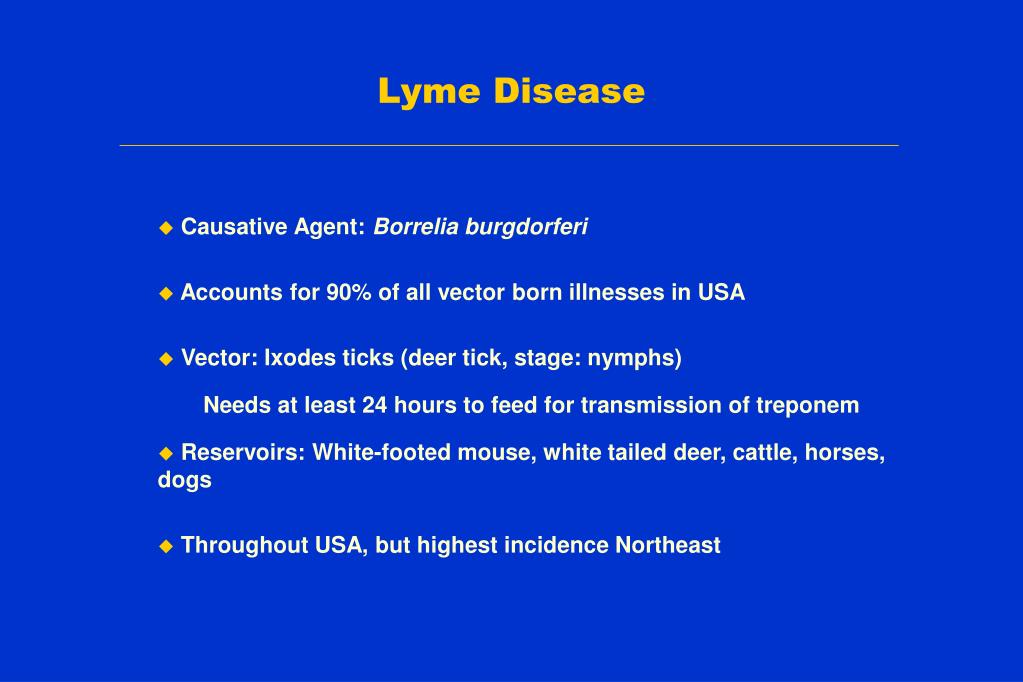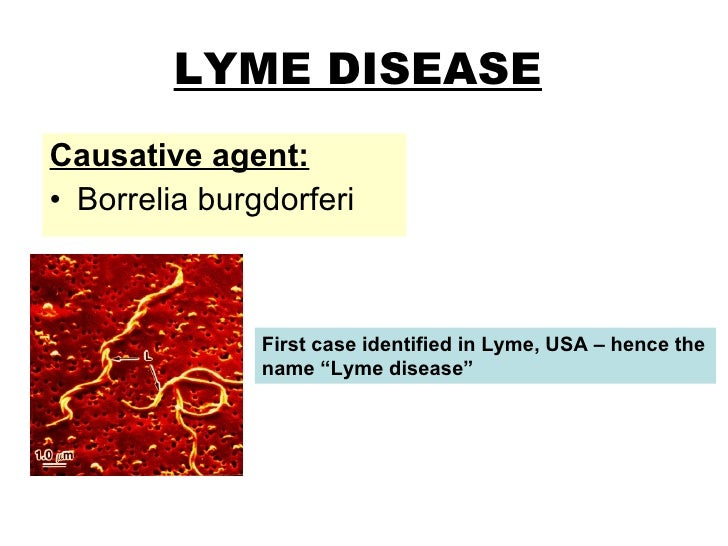When treated early the disease usually resolves but left untreated can. Burgdorferi sensu lato complex suggesting that.
Hu b Kim Lewis.

Lyme disease causative agent. The causative agent is the spirochete Borrelia burgdorferi species complex and the hard-shell ticks of the genus Ixodes is responsible for pathogen transmission from animals to humans. This pathogen is a spirochete with endoflagella an outer membrane with LPS-like substance an inner membrane and a periplasmic space which contains a layer of peptidoglycan Tilly Rosa Stewart 2009. The blacklegged tick or deer tick Ixodes scapularis spreads the disease in the northeastern mid-Atlantic and north-central United States.
Typical symptoms include fever headache fatigue and a characteristic skin rash called erythema migrans. Lyme disease is caused by the bacterium Borrelia burgdorferi and rarely Borrelia mayonii. When Lyme disease was first identified in rural Connecticut in 1975 the cause of its rheumatoid arthritis-like symptoms was unknown.
Larval and nymphal stages of the tick acquire the organism when they feed on infected mice. Lyme borreliosis is the most common human tick-borne illness in the Northern Hemisphere. Borrelia B mayonii sp.
Physicians suspected a virus was behind the outbreak butwithout knowing its true agentattempts at further understanding the pathogenesis and possible treatments of Lyme disease were unsuccessful. The causative agent of Lyme disease is Borrelia burgdorferi. J Infect Dis.
There is no definitive evidence for the existence in Australia of B. Duration of tick attachment as a predictor of the risk of Lyme disease in an area in which Lyme disease is endemic. Previous data reveal a higher spirochaetemia in the blood compared to patients infected by LD spirochetes belonging to the B.
Borrelia burgdorferi is the causative agent of Lyme disease which affects an estimated 300000 people annually in the US. Causative agent of true Lyme disease or for any other tick-borne spirochaete that may be responsible for a local syndrome being reported as Lyme disease. Borrelia burgdorferi Bb is the causative agent of Lyme disease transmitted to humans by ticks of the Ixodes spp.
Sood SK Salzman MB Johnson BJ et al. The Lyme disease bacterium Borrelia burgdorferi is spread through the bite of infected ticks. Borrelia burgdorferi the causative agent of Lyme disease is maintained in a complex life cycle of small wild mammals and immature stages of the black legged tick Ixodes scapularis formerly called Ixodes dammini and Ixodes pacificus.
The western blacklegged tick Ixodes pacificus spreads the disease on the Pacific Coast. Eventually Lyme disease was shown to be caused by Borrelia burgdorferi. Symptoms in humans may include a characteristic rash.
Ixodes scapularis the primary vector of Borrelia burgdorferi the causative agent of Lyme disease has also been implicated in transmission of the causative agent of human granulocytic ehrlichiosis HGE 2. Bb is a unique bacterial pathogen because it does not require iron Fe 2 for its metabolism. INTRODUCTION Lyme disease is a tick-borne zoonosis caused by the spirochaete bacterium Borrelia burgdorferi.
Burgdorferi the causative agent of true Lyme disease or for any other tickborne spirochaete that may be responsible for a local syndrome being reported as Lyme disease. The causative agent the spirochaete Borrelia burgdorferi is transmitted to the host by a tick bite. Lyme borreliosis in humans is an inflammatory disease affecting multiple organ systems including the nervous system cardiovascular system joints and muscles.
Matluck a Linden T. Has recently been reported as a novel human pathogenic spirochete causing Lyme disease LD in North America. It is now recognized that Lyme disease has been around for centuries.
It is transmitted to humans through the bite of infected blacklegged ticks. Borrelia burgdorferi the Causative Agent of Lyme Disease Forms Drug-Tolerant Persister Cells Bijaya Sharma a Autumn V.

